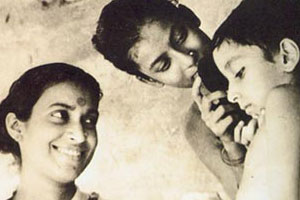Rang e Huda (Colour of Paradise/God)

This is Iranian film-maker Majid Majidi's first outing since the glorious Oscar-nominated 'Children Of Heaven' in 1997, but it has been well worth the wait. This film too is about children and childhood but revolves slowly and somewhat mystically around a child who lives in a world that he cannot see, though he himself wanders through a world that other people cannot be bothered to hear. It is a visual and aural work of beauty, splendour and sadness, a tale of isolation and melancholy, of loving maternal embraces and paternal indifference, of simple needs set against the backdrop of complicated human frailty.
Eight-year-old Mohammed (Mohsen Ramezani) attends a school for the blind where he finds kindred spirits, love and the many wonders of learning. His father, Hashem (Hossein Mahjub) wants to marry a stunning young woman from a very strict Islamic family and it doesn't take long to realise that he feels his son's 'affliction' will ruin his chances. Having unsuccessfully tried to persuade the teachers at the blind school to keep Hashem there permanently, he apprentices him to a local blind carpenter against the wishes of the young boy, who only wants to go to the normal school and learn with everyone else.
Seen within the political and religious parameters of an Islamic country, it is not hard to appreciate why Mohammed receives so much love and care from the people at the blind school and the female members of his family, considering that they are as much disenfranchised and powerless as he is. But when it comes to the love that he truly yearns for, from his father, it is so wanting as to make the viewer angry and frustrated at his shallow and self-serving reasons. Mohammed knows this, but yet loses himself in a dark world that he allows to be filled with a blinding cacophony of sound and the wonderful sensuality and grounded reality of touch.
The whole movie floods us with visual imagery that he cannot see but of which we know he is so aware, letting us join his darkened world in a constant stream of accentuated sounds. Bird song, crickets, water, voices and the breeze have never sounded so distinct and emotive. Ramezani in the role of Muhammed, never once slips into American saccharin self-pity but instead, draws us into the duality of his world of beauty and sadness until his cries of frustration become ours too.




